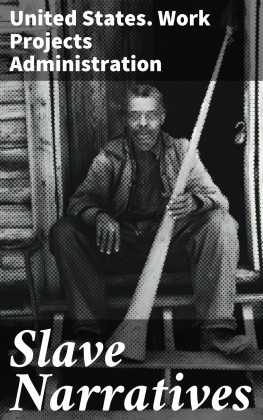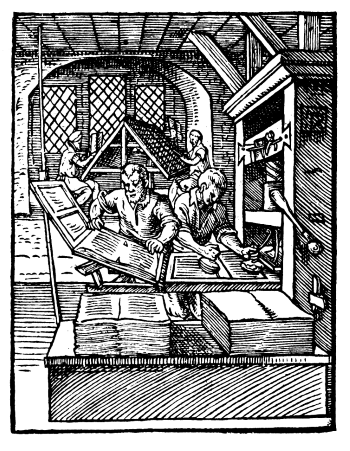United States. Work Projects Administration
Slave Narratives
A Folk History of Slavery in the United States. From Interviews with Former Slaves / Kansas Narratives
Published by Good Press, 2019
EAN 4064066244736
WASHINGTON 1941
VOLUME VI
KANSAS NARRATIVES
Prepared by
the Federal Writers' Project of
the Works Progress Administration
for the State of Kansas
INFORMANTS
THE AMERICAN GUIDE
TOPEKA, KANSAS
EX SLAVE STORY
OTTAWA, KANSAS
BY: Leta Gray (interviewer)
"My name is Clayton Holbert, and I am an ex slave. I am eighty-six years old. I was born and raised in Linn County, Tennessee. My master's name was Pleasant "Ples" Holbert. My master had a fairly large plantation; he had, I imagine, around one hundred slaves."
"I was working the fields during the wind-up of the Civil War. They always had a man in the field to teach the small boys to work, and I was one of the boys. I was learning to plant corn, etc. My father, brother and uncle went to war on the Union side."
"We raised corn, barley, and cotton, and produced all of our living on the plantation. There was no such thing as going to town to buy things. All of our clothing was homespun, our socks were knitted, and everything. We had our looms, and made our own suits, we also had reels, and we carved, spun, and knitted. We always wore yarn socks for winter, which we made. It didn't get cold, in the winter in Tennessee, just a little frost was all. We fixed all of our cotton and wool ourselves."
"For our meat we used to kill fifteen, twenty, or fifty, and sometimes a hundred hogs. We usually had hickory. It was considered the best for smoking meat, when we butchered. Our meat we had then was the finest possible. It had a lot more flavor than that which you get now. If a person ran out of meat, he would go over to his neighbor's house, and borrow or buy meat, we didn't think about going to town. When we wanted fresh meat we or some of the neighbors would kill a hog or sheep, and would divide this, and then when we butchered we would give them part of ours. People were more friendly then then they are now. They have almost lost respect for each other. Now if you would give your neighbor something they would never think of paying it back. You could also borrow wheat or whatever you wanted, and you could pay it back whenever you thrashed."
"We also made our own sorghum, dried our own fruits. We usually dried all of our things as we never heard of such a thing as canning."
"We always had brandy, wine, and cider on hand, and nothing was thought of it. We used to give it to the children even. When we had corn husks, log rolling, etc., we would invite all of the neighbors over, and then we would serve refreshments of wine, brandy or cider."
"We made our own maple syrup from the maple sugar trees. This is a lot better than the refined sugar people have nowdays, and is good for you too. You can't get this now though, except sometimes and it is awfully high priced. On the plantations the slaves usually had a house of their own for their families. They usually built their houses in a circle, so you didn't have to go out doors hardly to go to the house next to you. If you wanted your house away from the rest of the houses, they could build you a house away from the others and separate."
I was never sold, I always had just my one master. When slave owners died, if they had no near relatives to inherit their property, they would 'Will' the slaves their freedom, instead of giving them to someone else. My grandmother, and my mother were both freed like this, but what they called 'nigger traders' captured them, and two or three others, and they took them just like they would animals, and sold them, that was how 'Ples' Holbert got my mother. My grandmother was sent to Texas. My mother said she wrote and had one letter from my grandmother after that, but she never saw her again."
"My mother used to be a cook, and when she was busy cooking, my mistress would nurse both me and her baby, who was four weeks older than me. If it happened the other way around, my mother would nurse both of us. They didn't think anything about it. When the old people died, and they left small orphan children, the slaves would raise the children. My young master was raised like this, he has written to me several times, since I have been out here in Kansas, but the last time I wrote, I have had no reply, so I suppose he was dead."
"When anyone died, they used to bury the body at least six feet under the ground. There wasn't such a thing as a cemetery then, they were just buried right on the plantation, usually close to the house. They would put the body in a wagon, and walk to where to bury the person, and they would sing all of the way."
"The slaves used to dance or go to the prayer meeting to pass their time. There were also festivals we went to, during the Christmas vacation. There was always a big celebration on Christmas. We worked until Christmas Eve and from that time until New Year's we had a vacation. We had no such thing as Thanksgiving, we had never heard of such a thing."
"In August when it was the hottest we always had a vacation after our crops were all laid by. That was the time when we usually had several picnics, barbecues or anything we wanted to do to pass our time away."
"After the war was over, and my father, brother and uncle had gone to war, it left my mother alone practically. My mother had always been a cook, and that was all she knew, and after the war she got her freedom, she and me, I was seven or eight years old, and my brother was fourteen, and my sister was about sixteen. My mother didn't know what to do, and I guess we looked kind of pitiful, finally my master said that we could stay and work for him a year, people worked by the year then. We stayed there that year, and then we also stayed there the following year, and he paid us the second year. After that we went to another place, Roof Macaroy, and then my sister got married while we were there, and then she moved on her husband's master's place, and then we went too. After that I moved on another part and farmed for two or three years, and then we moved to another part of the plantation and lived there three or four years. That was almost the center of things, and we held church there. All of the colored people would gather there. The colored people who had been in the North were better educated than the people in the South. They would come down to the South and help the rest of us. The white people would also try to promote religion among the colored people. Our church was a big log cabin. We lived in it, but we moved from one of the large rooms into a small one, so we could have church. I remember one time after we had been down on the creek bank fishing, that was what we always did on Sunday, because we didn't know any better, my master called us boys and told us we should go to Sunday school instead of going fishing. I remember that to this day, and I have only been fishing one or two times since. Then I didn't know what he was talking about, but two or three years later I learned what Sunday school was, and I started to go."
"I went to a subscription school. We would all pay a man to come to teach us. I used to work for my room and board on Saturday's, and go to school five days a week. That would have been all right, if I had kept it up, but I didn't for very long, I learned to read and write pretty good though. There were no Government school then that were free."



